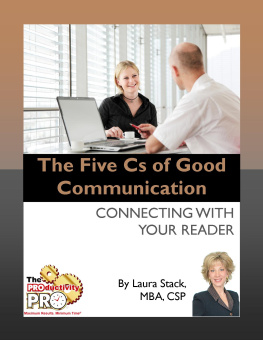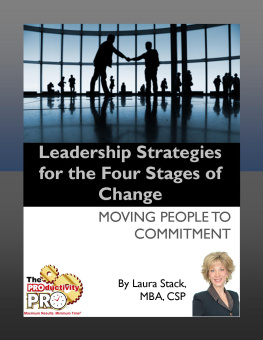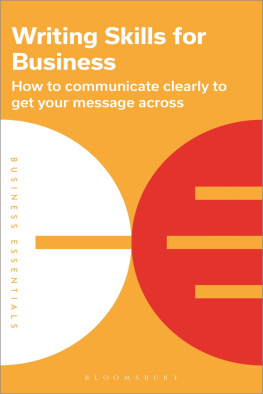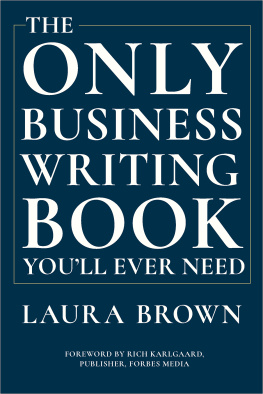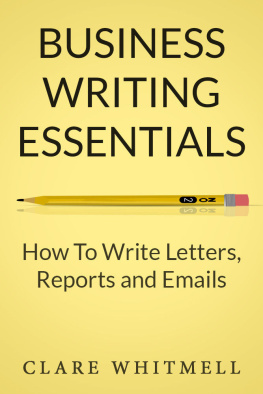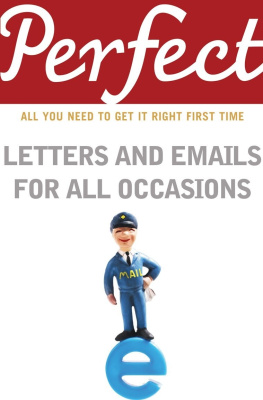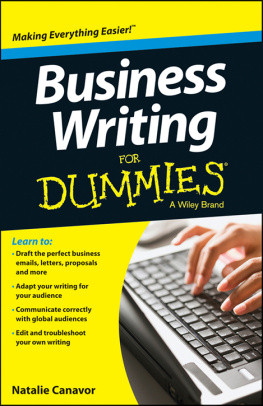The Five Cs of Good Communication:
Connecting with Your Reader
Introduction
As the author of several published books, Im often askedfor advice by professionals looking for new jobs, and whether youre writingemails, cover letters, or rsums, I believe there are five main communicationprinciples that you should keep in mind. They are what I call the 5 Cs of GoodCommunication. In this ebook, Id like to cover these 5 Cs andthen give you some specific ideas that will help you in your job search.
The 5 Cs are as follows:
1. Your communication must be Clear clear meaning free fromconfusion and ambiguity. Your writing is cogent; it is understandable, and itis expressive.
2. Your writing should be Concise, meaning short, to the point, brief, and asmuch as possible using one word rather than two.
3. Yourwriting should be Concrete. In this I mean specific and not vague. Youwant your writing to be definite and not general or abstract.
4. Correct: When your writing is correct, it is free from error; it is accurate. It usescorrect grammar, spelling and punctuation, and is free from all typos.
5. Thefinal C in our Good Communication is Conversational conversational orfamiliar, like a verbal chat. Its friendly. Its informal without usingjargon or having too much slang.
Lets go through these, one at a time, and have you thinkabout how you might apply this to your writing as you are searching for yournext career move.
Making Your Communications Clear
The first C of Good Communication is to make yourcommunications clear.
During the Mad Hatters tea party in Lewis Carrolls Adventuresin Wonderland, the March Hare told Alice It is never enough just to meanwhat you say. You must also say what you mean. That is, the words that youchoose must express your ideas and feelings clearly to your audience whether youare speaking or writing. Not bad advice from an insane rabbit, huh? So, whenyoure looking at what youre trying to say, there are some principles that Idlike to cover.
The first is the familiar KISS Keep It Short and Simple. Make your writing easy to understand. Simple writing is easier for your readerto remember and to comprehend. If you compare Lincolns Gettysburg Address,for example, to the latest bill from Congress, one says it all very simply andbriefly, yet beautifully. The other talks a lot, but says very little.
This is not a new concept. George Orwell said Never use along word where a diminutive one will do. Bring it down a level. Talk asnormal people do. Winston Churchill said, Short words are best, and the oldwords, when short, are best of all. In other words, use familiar words thatpeople recognize. Now, Im not saying to use a big word that conveys your ideaefficiently if its appropriate for that person or audience but rather tonot use confusing language.
If you mean to begin, dont say commence or initiate. Thebigger the word is, the more open for interpretation that word will be.
If you mean to give, dont say render.
If you want to say facilitate, say teach if thats actuallywhat you mean, because facilitate could mean much more than teach. Itcould mean help. It could mean to gather a group about for discussion. There are so many uses of the word facilitate. Keep it easy to understand,and say what you mean.
Second, make sure that in your job search youre not writingsimply to be pompous and pretentious. Seek to express what you mean to say,not just to impress your reader. Some speak using heightened vocabulary simplyin an attempt to impress people. Do you really speak that way? Now, I knowsome people who have an extremely elevated vocabulary, and when you get into aprivate conversation with those people, they really are speaking with thislofty vocabulary. If thats truly you, thats fine, but dont put in writingwhat you normally would not say.
Making Your Communications Concise
The second C, again, is to make your communications concise:simple and short. Lets go through some principles on this one.
First, eliminate wordy or redundant expressions. Inpeoples writing, you see a lot of prepositional phrases that really say thesame thing twice. The more words you can get rid of in your writing, the morepower and energy it will have. Instead of saying continue on, you would justsay continue. Why would you say continue on? Would we continue back? Of course not, so you would just say continue. What about cooperatetogether? People say this all the time: Were going to cooperatetogether. What are we going to do? Cooperate apart? Of course were goingto cooperate together just say cooperate.
Also people string along multiple words like in view of thefact that instead of just saying because. Or they say in the event ofinstead of just if. So really take a look at redundancy in your writing. Ifthe word because will suit, dont say due to the fact that.
The second concept in making your communications concise isthat one word is better than two or better than seven! Edit ruthlessly. Hereis an excerpt of a letter, as a sample:
Please be advised that theseadjustments should be completely finished within a period of three weeks. Thank you for your interest and attention to this matter.
Wow! How about We willcomplete these adjustments within three weeks. Thank you. That is a lot moreconcise and said exactly the same thing.
Another example is, In thisletter, we have attempted to answer all of your questions, and we hope that ifyou have any additional questions whatsoever, you will not hesitate to contactus. Oh my goodness! Why not just say If you have additional questions,please contact us. For that reason, really think about how you can truncateyour writing.
Third, to make it more concise,you want to use active voice, where the subject performs the action. Weve allheard passive versus active where, for example, the road was crossed by thechicken is passive, instead of the chicken crossed the road, which isactive. Passive voice is usually marked with a prepositional phrase, so whatis the difference between those two sentences? Active voice is shorter. Itsmore powerful. Its direct. Its forceful, and it has more energy.
To change your writing frompassive to active, you have to ask yourself who or what is doing the action inthe sentence, or you can also ask by whom. For example, a passive sentencewould be The check was signed by my boss. You see the giveaway at the endwith the prepositional phrase? Instead, My boss signed the check is active. If you said, The check was signed by whom, the answer to that question isusually the subject.
Similarly, The letter wastyped by the secretary is passive, because we know that if we said, by whom,the secretary is typing the letter. Be careful with active versus passive. Instead of saying An employees extra efforts should be recognized, you mayhave to identify the true subject: A boss should recognize an employeesextra efforts.
Fourth in making your writingmore concise is to un-smother your verbs. Dont turn a verb into a noun. Now,how do you do that? Words that have -ion on the end are often verbs thatwere nouns. Suffixes add length to your words, but not meaning to the idea. For example, if you said, He caused distractions in the classroom, why notsay He distracted the others in the classroom? You took a perfectly goodverb and turned it into a noun.
If you want to offer a suggestion, why not say Isuggest...?
We see this all the time in peoples writing: Im going to takeit under consideration. Really? Why dont you just consider it instead?

